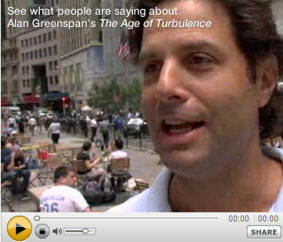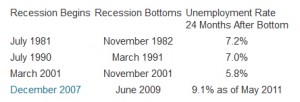The following article by Lynn Carpenter shows an interesting correlation between currency appreciation (or depreciation) and stock market returns. London is a money town. It has been the center of the whole Western world’s currency transactions for three centuries. Until 1945, the British pound sterling was the world’s primary reserve currency. The pound is less popular than the dollar or euro now. But whatever currency is king, London is likely to bank it, trade it and exchange it. London bankers and brokers were old in the business when the New York Stock Exchange was born under a buttonwood tree on Wall Street. London bankers and fund managers were master investors when U.S. stock … [Read more...]
Market Turbulence
Alan Greenspan was appointed Fed chairman by Ronald Reagan in August 1987, he was reappointed by Bush and Clinton, at successive four-year intervals until retiring after a record-setting tenure on January 31, 2006. During that time period he was one of the most powerful men in the world. The stock markets literally hung on his every word. People made it their full time job to try and decipher what cryptic meaning might be obtained from his press releases. At times his words boosted the market as he dealt with issues like the Black Monday stock market crash that occurred shortly after he first became chairman. At other times he tried to talk the market down and he referred to the … [Read more...]
Falling Oil Prices: Worrying Trend or Saving Grace?
By Marin Katusa, Casey Energy Team When oil prices start to decline, investors and economists get worried. Oil prices in large part reflect global sentiment towards our economic future – prosperous, growing economies need more oil while slumping, shrinking economies need less, and so the price of crude indicates whether the majority believes we are headed for good times or bad. That explains the worry – those worried investors and economists are using oil prices as an indicator, and falling prices indicate bad times ahead. But oil prices have to correct when economies slow down, or else high energy costs drag things down even further. And the current relationship between oil prices and … [Read more...]
Why the System is Coming Unglued
It is ironic that a country that was built on a system of checks and balances now has a monetary system that is accountable to no one... the way our monetary system is structured, the government can literally print money and spend it on anything, no matter how foolish ... it has no checks and balances. And so according to many estimates the unfunded liabilities run $75 to $100 trillion... these can never be paid off. It has grown to this level because there are no real operating principles other than buying the votes needed to get re-elected and to stay in office for as long as they can. If you would have asked anybody on this planet five, six years ago, if the US government could run a … [Read more...]
Money Essentials for These ChaoticTimes
Trying times are upon us. There are a few essentials you absolutely must understand if you are going to thrive or at least survive financially over the next few years. If you want serious money, you have to get serious about money. You need to understand these fundamentals and never forget them. Here are the fundamentals: Liquidate, Consolidate, Create and Speculate. The key to becoming wealthy is simple to state but totally incomprehensible to modern society. Simply produce more than you consume and save the difference. But we are taught that consumption is the goal. He who dies with the most toys wins... Consumption is the good that will save our country. But is it true or is … [Read more...]
Has the Fed Started QE3?
By Bud Conrad, Casey Research The Fed surprised the market by extending its policy of 0 to 0.25% Fed funds rate to mid-2013. The way the Fed manages to drive rates lower is to buy Treasuries with newly created money – driving the price up and the rates down. The big question is whether the policy will have a sizeable effect on markets. The chart below shows the historical jump in the Fed’s combined policy tools that were used to lower rates and bail out financial institutions through a variety of programs. These include the big purchase of mortgage-backed securities (MBS) called QE1 and the large purchase of Treasuries called QE2. The point of the extrapolation in the chart is just to … [Read more...]
Can You Really Get a Free Credit Report?
Anyone who has surfed the web long enough has probably seen offers for "Free Credit Reports" but when you go there you usually find that it is just a scam that requires you to register or buy something first. Well, I recently found the one true source of free credit reports and actually was able to verify it with the Federal Trade Commission! I strongly recommend that before you sign up for any free credit report that you check it with the FTC. (See the end of this article for a link to the FTC). -- editorIn the United States, there are three main credit reporting companies they are Equifax, Experian, and Trans Union. They are strictly monitored by the Federal Government and are required … [Read more...]
Bud Conrad: Volatile Markets Show Original Credit Crisis Is Still With Us
Bud Conrad, Chief Economist Bud Conrad, the chief economist for Casey Research, sat down with Jim Puplava on the Financial Sense Newshour to discuss the ongoing debt crisis, the fate of the Euro, Fed policy, and other key issues. "The situation is that the world's economy is not well balanced. We in the US have taken over the bank debt by bailing out banks and taking over Fannie and Freddie, but we haven't handled the government debt and deficits in a way that we can get through this storm." Click play below to listen to his interview in its entirety. http://www.netcastdaily.com/broadcast/fsn2011-0816-1.mp3 Our country’s debt crisis will devastate you if you don’t adjust your … [Read more...]
Recession Watch- Where are We Now?
Recessions are generally caused by a shrinking money supply and/or an increase in demand for cash. In the last two years the M1 money supply has grown by 40% and still the economy is weak, the unemployment rate is high... basically no recovery. Why? In this article Terry Coxon discusses the slow recovery and how it compares to previous recessions. ~Tim McMahon, editor Economically Sleepwalking Terry Coxon, Senior Economist Until the Great Depression of the 1930s, the average length of a recession was 21 months. The misery that began in October 1929 lasted five times that long – 105 months.... the government pursued an array of policies to prevent prices from falling, which had the … [Read more...]
The Real Basket of Goods
I recently received the following from Ed Devol, "When I try to educate people about the impact of inflation, I find putting it in terms of time worked for something is a good way of explaining inflation". Thanks, Ed. I agree, when I am deciding whether to purchase something, I like to think of it in terms of how many hours I have to work to buy it. (It helps keep it "real"). In addition economists often link how many hours the average person has to work to eat. A poor country might require eight hours of work a day just to eat. While a rich country might require only 1 hour a day. So you might like the following article by Lynn Carpenter as she tracks prices and earnings over the last 60 … [Read more...]



